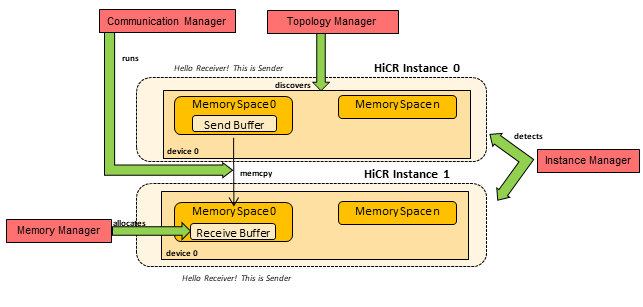Memcpy: Distributed
In this example, we test HiCR’s memcpy operation to communicate a simple message back and forth (ping / pong) between two HiCR instances as detected by the HiCR::InstanceManager (See: Fig. 2).

Fig. 2 Remote Memcpy Example
The code is structured as follows:
include/remoteMemcpy.hppcontains the application’s backend-independent semanticssource/contains variants of the main program implemented under different backends
This example expects to be launched with exactly two HiCR instances. For example, by using the following commands:
mpirun -n 2 examples/memcpy/distributed/mpi
lpfrun -n 2 -engine ibverbs examples/memcpy/distributed/lpf
Both the remoteMemcpy function receives a full set of HiCR managers, used to perform the following steps:
Identifying HiCR instances
Since this example is designed to work with only two HiCR instances, we must check whether this condition is met. For this, we get the total number of instances:
auto instanceList = instanceManager->getInstances();
if (instanceList.size() != 2) // Error: wrong number of instances!
Second, we need to decide which instance is going to be the sender and which the receiver. To decide this, we decide that the HiCR root instance must the be sender. The other instance will be the receiver.
auto senderId = instanceManager->getRootInstanceId();
Memory slot allocation
To allocate the memory slots to use as send/receive buffer, we must first identify the local topology and find a suitable memory space from whence to allocate them.
// Asking backend to check the available devices
const auto topology = topologyManager->queryTopology();
// Getting first device found
auto device = *topology.getDevices().begin();
// Obtaining memory spaces
auto memSpaces = device->getMemorySpaceList();
// Getting the first memory space we found
auto firstMemSpace = *memSpaces.begin();
Having found a suitable memory space, we allocate our buffers from it:
// Allocating send/receive buffer
auto bufferSlot = memoryManager->allocateLocalMemorySlot(firstMemSpace, BUFFER_SIZE);
Memory slot exchange
After creating the local memory slots, we need to exchange them before they engage in remote communication. The receiver instance exchanges its receive buffer to be visible by the sender. On the other hand, the sender instance does not need to exchange its own buffer.
// Performing memory slot exchange now
if (myInstanceId == senderId) communicationManager->exchangeGlobalMemorySlots(COMM_TAG, {});
if (myInstanceId == receiverId) communicationManager->exchangeGlobalMemorySlots(COMM_TAG, {{myInstanceId, bufferSlot}});
// Synchronizing so that all actors have finished registering their global memory slots
communicationManager->fence(COMM_TAG);
// Getting remote memory slot from receiver
auto receiverSlot = communicationManager->getGlobalMemorySlot(COMM_TAG, receiverId);
Copying data and syncing
To copy data, the sender runs memcpy with the receiver’s memory slot as destination. This acts as a one-sided put operation.
if (myInstanceId == senderId) communicationManager->memcpy(receiverSlot, DST_OFFSET, bufferSlot, SRC_OFFSET, BUFFER_SIZE);
communicationManager->fence(COMM_TAG);
It is also possible to obtain the number of messages received for a given memory slot:
communicationManager->queryMemorySlotUpdates(receiverSlot);
auto recvMsgs = receiverSlot->getSourceLocalMemorySlot()->getMessagesRecv();
The expected result of running this example is:
[Receiver] Received Message Count: 1
[Receiver] Received buffer: Hello, receiver! This is sender.